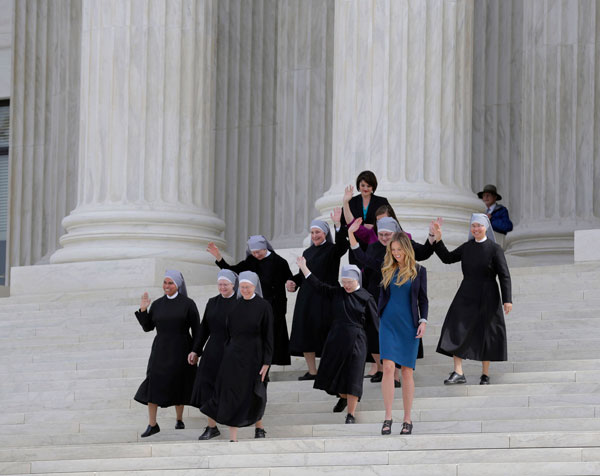
By Carol Zimmermann
WASHINGTON (CNS) – A leaked draft rule from the Department of Health and Human Services exempting religious groups from the contraceptive mandate of the Affordable Care Act was welcomed by church officials and attorneys representing the Little Sisters of the Poor, one of the groups that challenged the mandate at the U.S. Supreme Court.
Archbishop William E. Lori of Baltimore, Md., chairman of the U.S. Bishops’ Ad Hoc Committee for Religious Liberty, said that the leaked draft has “yet to be formally issued and will require close study upon publication,” but it provides encouraging news.
“Relief like this is years overdue and would be most welcomed,” he said.
The archbishop noted that if the ruling is issued it would “lift the government-imposed burden on our ministries to violate their own teachings within their very own institutions.”
He also said the draft of the HHS regulations reflects common sense and a long-held practice of the federal government to provide strong conscience protection in the area of health care.
“Better late than never,” said Mark Rienzi, senior counsel with Becket, the law firm representing the Little Sisters of the Poor. “At long last the United States government acknowledges that people can get contraceptives without forcing nuns to provide them. That is sensible, fair and in keeping with the Supreme Court’s order and the president’s promise to the Little Sisters and other religious groups serving the poor.”
The 125-page document leaked to the press May 31 – and under final review by the White House Office of Management and Budget – details objections to the Affordable Care Act’s requirement that employers cover contraceptives in their employee health plans despite their moral objections to such coverage.
It would leave in place the religious accommodation created by President Barack Obama’s administration for nonprofit religious entities such as church-run colleges and social service agencies that are morally opposed to contraceptive coverage and can file a form or notify HHS that they will not provide it.
The draft rule also would broaden this exemption to cover employers with religious or moral objections to providing coverage for some abortifacients. The new rule also makes it clear that insurers may issue separate policies to women whose employers are exempt from the mandate.
The draft rule says it is attempting to “better balance the interests in preventive services coverage to the extent imposed through the ACA along with the interests throughout federal law to protect individuals and organizations with religious beliefs and moral convictions.”
It points out that the final rules are effective on an unnamed date and that written comments on these final rules will be invited and must be received 60 days after the rule is published in the federal register.
The communications office at HHS did not respond to a Catholic News Service request for comment.
Before signing an executive order on religious freedom May 4 at a White House ceremony, President Donald Trump told some of the Little Sisters of the Poor in the crowd: “Your long ordeal will soon be over.”
Last year the Supreme Court sent the cases including the Little Sisters’ back to the lower courts, expressed hope that both sides might be able to work out a compromise. The ruling cleared the slate from their previous court rulings where five appeals courts had ruled in favor of the contraceptive mandate and one ruled against it.
Cardinal Daniel N. DiNardo of Galveston-Houston, president of the U.S. Conference of Catholic Bishops, who met with the president just prior to the ceremony where he signed the executive order, said the order “begins the process of alleviating the serious burden of the HHS mandate,” but he also stressed that the U.S. bishops will “have to review the details of any regulatory proposals.”
Since the HHS rule was leaked May 31, a number of organizations announced that they will fight it in court.
The Becket statement also noted more work will need to be done if the HHS rule goes into effect, pointing out that “further legal action will still be necessary to wrap up the challenges to the prior version of the mandate.”
Archbishop Lori similarly noted that the U.S. bishops “look forward to the final version of the regulations with hope that they will remain strong.”
“At that time, we will analyze those regulations more carefully and comment on them more formally,” he said, stressing that the church’s goal is to “protect both the conscience of individuals and our mission of sharing the Gospel and serving the poor and vulnerable through our ministries.”
